FISCAL POLICY AND CHURCH SCHOOLS.
ELECTIONS only occasionally turn upon single issues. Even in the Election of 1885, says Mr. Morley in his Life of Mr. Gladstone, " there was nothing like general concentration on the Irish prospect. The strife of pro- grammes and the rivalries of leaders were what engrossed the popular attention. The main body of the British electors were thinking mainly of promised agrarian boons, Fair-trade, the Church in danger, or some other of their own domestic affairs." There will, it is true, be less excuse for this dissipation of political thought in 1904 than there was in 1885. The question, that is, shortly to come before the constituencies touches very nearly their own domestic affairs. It affects the price they will pay for every article they buy, and the price they will get for every article they sell. But even when the matter sub- mitted to them is as plain as this, particular sections of the electorate will be the sport of cross-currents. The advertising columns of our newspapers in which the voter is implored to put " Protestantism before politics " bear witness to one such current. There will be some electors who will ask themselves, not—" Is the candidate for whom my vote is solicited a Protectionist or a Free- trader.? " but—" Will he support or oppose the Liverpool Church Discipline Bill ? " This is an extreme case. But there will be others who will say frankly :—" I kuow little or nothing about fiscal problems. Mr. Chamberlain may be right or wrong. Mr. Balfour may be wise in stopping where he does, or timid in not going further. These are questions I am content to leave to experts, and if only these were to be, decided at the next Election, I should contentedly stay away from the poll. But elementary education is a question I do know sOmething about, and I cannot but see that the result of the coming contest may have far-reaching educational consequences. If I vote for a Free-trader I may be helping to bring a party into, power whose declared purpos3 is to upset the Act of 1902 and to sweep away Church schools. How can I do this when to me the place of religion in elementary education 18 far more important than any question of taxation or Custom-duties " This is an attitude for which we have great respect, and our present object is to point out to those who main- tain it that if they are Free-traders they will do no harm to Church schools by voting for a Free-trade candidate. We believe that it can be shown that the two questions are quite distinct, that whichever party wins certain things are likely to happen, that certain other things will not happen, and, as a deduction from this, that no one need be deterred from giving his vote in favour of a Free-trader by any fear of the educational consequences.
We do not, of course, deny that the position of Church schools has been greatly weakened by the sudden uprising of the fiscal issue. Down to Mr. Chamberlain's momen- tous speech at Birmingham the unity of the Unionist party and the position of the Unionist Government seemed well assured. Mr. Chamberlain's action broke the party in two, and sent a section of the Cabinet into the wilderness. If the result of the next Election were to undo this by wiping out the " preferential " element in the party, and leaving Mr. Balfour's Cabinet as strong without Mr. Chamberlain as it once was with Mr. Chamberlain, Church schools would no doubt be the gainers. The Education Act was Mr. Balfour's special child, and so long as his position in the party had remained unchanged. he would naturally have kept its main pro- visions intact. If, therefore, the question to be submitted to the electors were, " Will you have Mr. Balfour to reign over you ? " we should have no foundation for the appeal we are now making. Church schools would assuredly be more secure if he continued the undisputed head, and his policy the undisputed policy, of the Unionist party.. But this is only another way of saying that Church schools, and many other things as well, would be more secure if Mr. Chamberlain had not found himself compelled by the tendency of his convictions to break up the party aiid to leave the Government. The situation we have to lice now is the situation that has followed upon these acts, and every available indication goes to show that it is a situation which can bode no good to Mr. Balfour or to his Cabinet. If the victory falls to Free-trade, the result must be either a Liberal Government pure and simple, or a Liberal Government with some admixture of Free-trade Unionists. If the victory falls to Protection, it becomes more probable every day that it will be Protection, in the declared form favoured by Mr. Chamberlain, not in the modified form favoured by Mr. Balfour. What the supporters of Church schools have to consider, there- fore, is how they will be affected by these alternative results. The third possibility—the reinstatement of Mr. Balfour as the undisputed chief of the Unionists—may be left out of account. His followers have already bridged over the interval which still separates him from his late colleague, and whatever it be in form, a Unionist victory will in substance be a victory for Mr. Chamberlain. Oar conviction, therefore, is that whatever happens at the General Election, the effect on Church schools will be very much the same. If the Liberals win, they will undoubtedly have to remedy the Nonconformist grievance about management. There is no need to inquire how. far this grievance is well founded. It is generally felt, and that is the only point on which the politician will need to satisfy himself. The objection to pay rates for voluntary schools may be, as we indeed hold it to be, wholly illogical, but it exists. It is not merely one form of the general indisposition to pay rates for any- thing. Those who feel it at all events believe that it is founded in conscience, and they have the means of making their strength felt in the Liberal councils. " Yes," it may be answered, " we know that a Liberal victory means interference with Church schools. You need not labour to prove this. It is the reason why, though we are not Protectionists, we intend to vote for the candidates who will support Mr. Chamberlain." Let us consider, then, what is likely to follow upon Mr. Chamber- lain's victory.
In the first place, it must be remembered that thouhg Mr. Chamberlain has left his "Radical days " a long way behind, he is very far from being a pure Conservative or "a strong Churchman." He has a keen eye to popular movements, and we may be sure that he has noted how very lukewarm Was the support given to Church schools by' the Unionists in the House of Commons, and how marked was the absence of such support among the work- mg-class voters. The Nonconformist vote is not a factor to be neglected in political combinations, and Mr. Chamber- lain will have some reasons for regarding it with special interest. He will have to build up a new party, and it will be very important to him to found it upon something more stable than the fragments of the old Unionist party. There are more grounds than one of possible difference between the Nonconformists and the Liberal party of the future, and Mr. Chamberlain will be quick to avail himself of the chances thus afforded of winning the Nonconformists to his side. Nor will he have anything to get over in his past. The Act of 1902 was no work of his. He was opposed to it in principle ; he had no hand in its prepara- tion, nor any share in carrying it through Committee. His own conception of an educational settlement is of a wholly different character, and he is not the man to let his own conceptions lie neglected when to give effect to them may have useful results in other directions. Mr. Chamberlain's educational policy is at bottom identical with the policy most in favour with the Liberal party ; why should he refrain from bringing it forward when it may 'be made the occasion of winning back a large section of Nonconformist support ? The risk of alienating any large amount of Unionist support by so doing would be very small, for the history of the Kenyon-Slaney Clause showed conclusively the strong feeling on the Unionist side of the House in favour of popular management, and the unwillingness to assign to the clergy more than a fractional share in the ordering of what they have been accustomed to regard as their own schools. So far, therefore, as the fate of Church schools is con- cerned, an elector may dismiss the subject from his mind when he next goes to the poll. The real choice he will have to exercise will be between a Free-trader and a sup- porter of Mr. Chamberlain, and whichever is the victor, the educational policy of the next Government is likely to be pretty much the same. The new Cabinet will have nothing to gain by keeping the educational sore open, and the few verbal alterations required to give a thoroughly popular character to the Management Clauses will be made, we suspect, without any very prolonged discussion.
This much comfort, however, it is possible to give. The supporters of Church schools need have no fear of confis- cation. They will hive to make their own terms with the local education authority, but they will enter upon the negotiation as owners who have buildings either to sell or to let. What these terms will be and what statutory sanction they will possess are matters upon which we cannot enter here. They are likely to be satisfactory to the owners of the schools in proportion as they realise the situation clearly, and consider in time what they shall yield and what they shall insist on. The worst policy they can pursue is that of refusing to look forward. It is tempting, no doubt, to assume that in 1902 the battle was won for a generation. But much that seemed in the highest degree improbable in 1902 has happened since, and it is well for Churchmen to bear in mind that their affairs enjoy no exemption from the general mutability. They cannot rest on their oars, but they may yet use them to'very useful purpose. Personally we greatly regret that the settlement of 1902 should so soon be called in question, but if 'any one is to be blamed for this, it is Mr. Chamber- lain,—the statesman who without a moment's warning destroyed that unity in the Unionist party' which alone could secure the inviolability of so highly contentious a measure as the Education Act of 1902.



















































 Previous page
Previous page